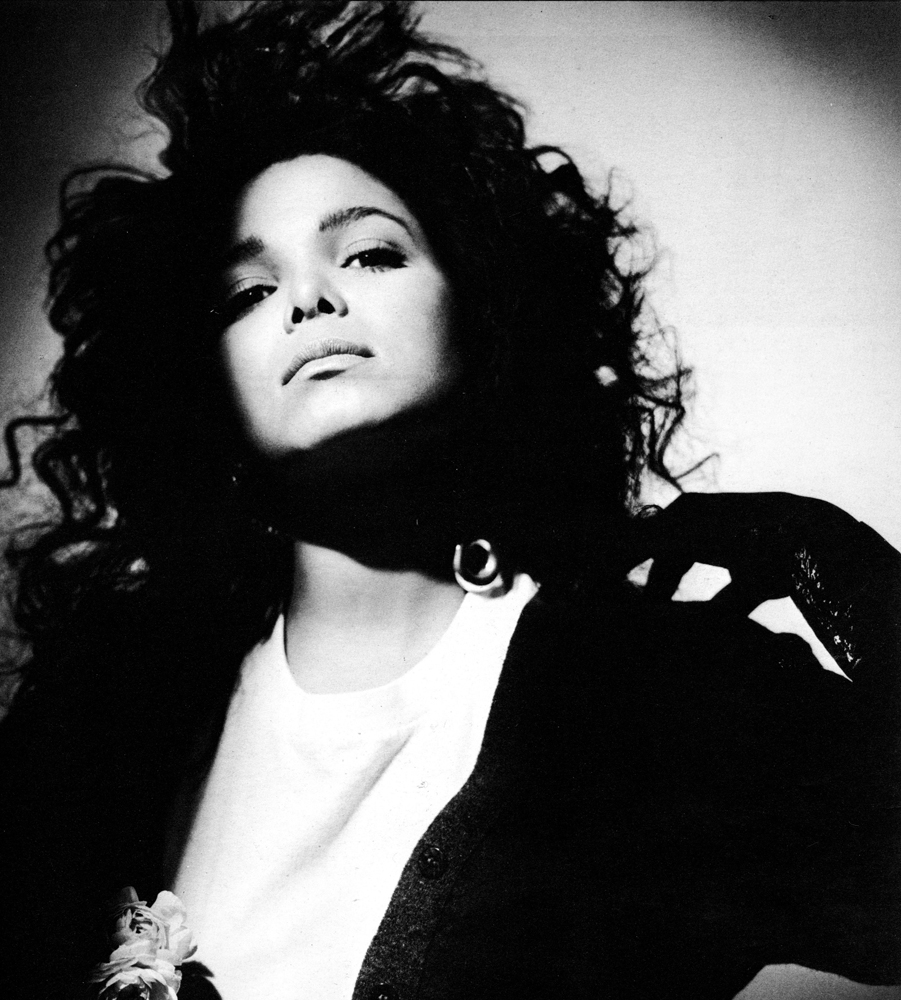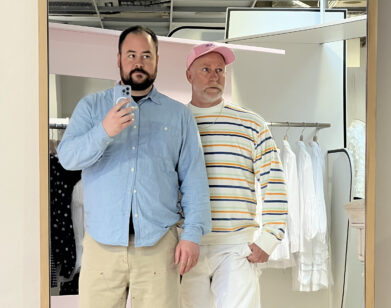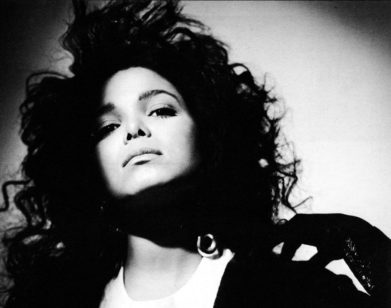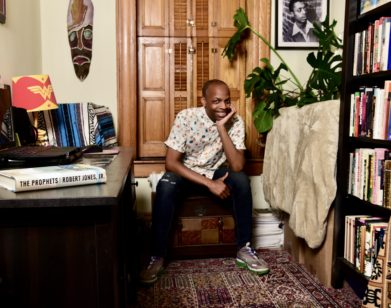new again
New Again: Janet Jackson
You might have noticed that Janet Jackson has been pretty absent from the music scene in recent months—and with good reason: at the age of 50, Ms. Jackson is expecting her first child with her husband, Qatari businessman Wissam al Mana. The official confirmation comes after months of speculation following the abrupt cancelation of her world tour in April and the pretty unambiguous hint that she was taking time to start a family. Sorry Rhythm Nation, but it looks like first-steps and tummy-time are going to be the extent of choreography that Jackson will be planning for a while.
To celebrate Jackson’s baby news, we’re reprinting her feature from Interview‘s February 1987 issue. At the time, she was still the fresh-faced baby sister of Michael, only just beginning to distinguish herself from her famous family and cement her place in music history after the release of her breakthrough album Control a year earlier. With a charming shyness far removed from the “diva” image she was soon to embody, Jackson discusses coping with her newfound fame, life at home with the Jacksons, and her relationship with “crazy” brother Michael. —Frank Chlumsky
Janet Jackson
By Lisa Robinson
Not only did Janet Jackson take charge of her musical career last year with the extraordinarily successful album Control, she also stepped forward as a confident young woman by coming out of the sheltered life provided by her famous family—her protective parents, Joe and Kathyrn, her eight older brothers and sisters, and in particular, her superstar brother Michael. Working with producers Jimmy Jam and Terry Lewis (ex of the Time) in Minneapolis, and encouraged by A&M Records’ A&R chief John McClain, Janet made an album that contained four Top Ten singles (including the Number One “When I Think of You“) and some of the sexiest music made in 1986 or any other year.
Janet had been in show business since she was small, performing with her brothers and then starring on sitcoms like Diff’rent Strokes and Good Times. But things started to change in 1984, when a stint on TV’s Fame coincided with her 18th birthday and a brief, ill-fated marriage to a member of another family singing group—James DeBarge. “A lot has happened to me in the last few years,” says Janet. “Even I’ve been surprised at how much I’ve changed.”
LISA ROBINSON: So much has been made of the fact that the Control album was like a coming-of-age for you. Were you at all nervous about the way it would be received?
JANET JACKSON: I was nervous about the way the public would receive it. At the same time, I was trying to write about subjects I thought girls could relate to, to let them know that they weren’t alone, that other people have problems as well. Especially people in this business. People feel that this line of work is so glamorous and there’s no heartache and nothing ever happens to you and you just have a great time. People tend to look at you as something not human.
ROBINSON: Had you really led that sheltered of a life? Are you as shy as has been said?
JACKSON: I’m shy, although I’m not shy with my friends and family. I was sheltered, and there’s good and bad to that. The good was not getting into the drugs and the alcohol and the really sorry stuff, and the bad was finally coming out into the real world and trying to deal with it, which was hard for me. My first time dealing with all that was when I was on Fame and when I got married.
ROBINSON: Were they at the same time?
JACKSON: They were at the same time. I was on Fame in 1984, then I moved out of my parents’ house, and then I got married.
ROBINSON: Before you were married, were your parents nervous about you living alone?
JACKSON: They were really frightened for me, because there’s so much going on today, and my being the baby of the family didn’t help any. But I wanted to get out in the real world more. Being around kids on Fame opened me up so much that when I would be around my family, they’d say, “Jan, you’re so outgoing now.” Actually, I’m not really that outgoing, but everyone in my family is so quiet.
ROBINSON: Do you think that they’re quiet, or insulated, like your family exists in a world unto itself?
JACKSON: We were very close, in a world of our own. Every once in a while we would have friends over, but we would never go to other friends’ houses and play. My parents were strict. They weren’t as strict on me as they were with the others, but my mother didn’t want us to get on anyone’s nerves… Go to someone else’s house and drive their parents crazy. Another thing was they didn’t want us to get into a lot of things that a lot of kids—if they’re not careful—can slip into.
ROBINSON: Were you all very religious? Are you all Jehovah’s Witnesses?
JACKSON: Not all of us are, no. I study once in a while. But my parents never pushed us into anything. Until we were 18, my mother would make us go with her to Kingdom Hall, and when we turned of age, she let us choose what we wanted to.
ROBINSON: Did you go from door to door with The Watchtower?
JACKSON: I did that twice.
ROBINSON: What was that like? Did people slam the door in your face?
JACKSON: A lot of people make fun of it… I would get upset if they slammed the door in our faces; I think it’s very rude. Even if you don’t want to hear about it, I don’t think that’s the way you should treat a person. And I’m not just saying this because my family is in this religion. If it was another religion coming to my door, I wouldn’t do that to them.
ROBINSON: Your mother is religious, and here you are, being very sexy on your album and in these videos. What does she think about all this?
JACKSON: See, I don’t find myself sexy. I think it’s a really nice compliment, but I don’t find myself sexy. I consider it sassy. The only thing I would say is sexy is “Funny How Time Flies.” My mother loves the song, but not the moaning at the end.
ROBINSON: But even with all the little nuances, the implication throughout the album is that you know more than people might expect you to. Tina Turner doesn’t think she’s sexy, either; she thinks she just jolly and fun.
JACKSON: Well, to be honest with you, that’s what I think I am: a lot of fun—a lot of fun to be with. And I like to have a lot of fun. I just don’t see myself as being sexy. It’s more sass—more attitude—than sex.
ROBINSON: Don’t guys act differently around you now?
JACKSON: I’ll meet a guy now, and the next thing I know they’ll be sweating and their hands will be shaking. And I feel so bad—I don’t even know what to say to them. Then there are other guys who come on too strong, and they’re just all over you. The nice ones are the ones who are in-between—the ones who aren’t scared and who aren’t all over you.
ROBINSON: Do you meet enough guys like that?
JACKSON: A few. I wouldn’t say enough. There are a few.
ROBINSON: How long were you married to James DeBarge?
JACKSON: A little more than a year.
ROBINSON: What about that story that John McClain encouraged you to annul your marriage?
JACKSON: No… I’ve known John since I was a baby; he used to change my diapers. He’s like part of our family. When I was going through my problems with James, I would talk to John on the phone; he was always there for me and very supportive, but that story is not true. I just never really got a chance to see James, and that was the major problem.
A lot of people thought I was selfish to annul the marriage because I couldn’t see him the way I wanted to, but some people can work for many hours and then come home and act fine. I can’t do that. I feel that when two people are married—not that you have to totally give up your career—you have to spend time with one another, get to know each other more, just share things with each other. And at that time, I had to leave at fur in the morning to be on the set of Fame to start shooting at six, and I wouldn’t get home until nine-thirty at night. Sometimes we’d shoot on the weekends, James would be in the studio at night, and he’d be getting home when I’d be getting up. It just wasn’t working well at all. I do want to get married again, and I want to have kids. And this time, I really want to do it right. I don’t regret anything that has happened, and I don’t think it was because I was young. I don’t care what age you are, it’s a great responsibility that you have to take, and you have to be ready for it. When I do get married again, I’m just going to take time off.
ROBINSON: Do you think you can’t have a boyfriend without being married?
JACKSON: No, I date. But the few times I have been out, people said I was with James, and we were getting back together.
ROBINSON: It wasn’t James though, was it?
JACKSN: No, it was Rene…
ROBINSON: Does he look like James?
JACKSON: I don’t think so, but a lot of people do. They think he looks like a DeBarge, but I don’t think so.
ROBINSON: Is he tall, thin, with a mustache?
JACKSON: Yeah…
ROBINSON: Do you see James at all?
JACKSON: Yes, once in a while. We talk, and he comes by and visits my mother, or brings me a gift. I spoke to his mother a while ago, and she says that he hasn’t gotten over it. But he’s dating now…
ROBINSON: Does that make you feel strange?
JACKSON: The only thing that bothers me is that the girls come up to me and say, “I’m dating your ex-husband.” I’m happy that he’s dating girls and getting out…. I feel he’s gotten over it, though. I just think his mother wants us to get back together again. She’s such a sweet lady.
ROBINSON: Is it too much of a distraction to be in love for you to still concentrate on work.
JACKSON: Yes, and it’s a really bad thing. I want to give all my attention to that one person and that person only. I want to spend all day, all night with that person, and that is it. I wouldn’t care if the world ended. That’s why now, when I date different guys, I just have to stay away—and not let myself fall. Because if I do, it’s over. It’s very hard trying to have love and a career at the same time. For those who can, great, but I can’t.
ROBINSON: Why did you move back to your parents’ house?
JACKSON: Well, I was going to move from the house I was in into a condo—something smaller—but my mother kept saying, “You know, if you want to move back here, you can.” I said, “Thank you, Mother, but that’s okay.” Then she called back again and said, “You know, it’s no problem at all if you want to move back; your bedroom’s always here. Even if you get married, we can come back here. You don’t have to move out just because you’re 18. You can still be 55 and live here.” The third time she called back and just said, “Janet, will you please move back home?” So I said okay. It’s fine with me—I can come and go as I please. Parents will be parents, but they’ve learned to let go. I like it, because La Toya and Michael are there.
ROBINSON: Do you see each other much, or do you tend to pass each other in the hallway? Do you all sit down to dinner together?
JACKSON: Once in a while we’ll do that. But everybody is so busy doing their own things. We’ll pass each other in the hallways, or sit down and talk, or watch TV together.
ROBINSON: There are so many rumors about your house. It’s made out to be some sort of Disneyland mansion.
JACKSON: That’s because we have the Tivoli lights—the whole house is lined in these little lights. It’s pretty, and it does kind of remind me of Disneyland.
ROBINSON: Do you read all of the stuff that’s written about you and the family and Michael? Do you laugh when you read it?
JACKSON: I used to read it and cry. But I laugh now.
ROBINSON: Where do you see those magazines? Do you buy them?
JACKSON: Yes, but sometimes I just find them lying around the house, not knowing who bought them—whether it was one of the workers of whoever. It’s so silly. If people want to know the truth, why don’t they just come to me and ask?
ROBINSON: But they can’t get to you, and they certainly can’t get to Michael. Obviously lots of things written are just made up. But it’s hard, too, when there’s a kind of wall around your family. You’ve all been famous for years—Michael had the biggest selling album ever. Surely you can understand the curiosity.
JACKSON: Sometimes I think they just want to be mean. But I guess it’s just something that comes with being in this business. Michael told me when you hear bad things about yourself, just put your energies into something else; it’s no good crying about it. Just put it into your music—it’ll make you stronger.
ROBINSON: Did you laugh when you read that you said Michael was a “weirdo”?
JACKSON: Yes. I probably just said, “Oh, Michael’s crazy” … like silly, fun. He’s very quiet, but every once in a while he says something that’s really funny, and I’ll say, “Oh, he’s crazy.” … Like a lot of fun to be around. And it was taken as his being “weird.”
ROBINSON: But people do think he’s weird, what with all the redoing of his face….
JACKSON: You know, so many stars do that, but the press picks on certain people. I think if more people could afford it, they would do it, too. I see nothing wrong with it. The thing is, you have to feel good about yourself. You can’t worry about pleasing other people; you have to please yourself. And against is a sad thing; I don’t see anything wrong with staying young looking as long as you can. Some people don’t care, but for those who do….
ROBINSON: What about those pictures of Michael in that hyperbaric chamber?
JACKSON: You know, I never asked him about that. I don’t know what that was….
ROBINSON: Well, it’s not in the house, is it?
JACKSON: [laughs] No, if it were in the house, I’d know it. But you know, knowing Michael, if he was doing something like that, it probably had to do with his voice.
ROBINSON: What sort of things do you do when you’re not working?
JACKSON: I like to read. Autobiographies. I’ve been trying to get a hold of Yes I Can, by Sammy Davis Jr., but I can’t find it anywhere. And I’ve been reading about Dorothy Dandridge. I love her.
ROBINSON: Would you want to play her in a movie?
JACKSON: God, I’d love to. Just like Marilyn Monroe is a lot of girls’ idol, that’s how I feel about Dorothy Dandridge. And she any Marilyn were very close friends. She went through a lot, and people told her that she couldn’t do certain things, but she didn’t let that bother her. She said in her mind that she was going to do them and that nothing was impossible, and she did it. It was so sad… She died from drugs, and drinking as well.
ROBINSON: Is that something that you know you’re never going to have to worry about getting involved with?
JACKSON: Yes. It’s not even a temptation. I’ve never tried pot; I’ve never tried anything. As far as drinking, I’ve had a Brandy Alexander… They’re so incredible, but they don’t affect you until you stand up. I was out once and had wine and I got sick to my stomach, and I vowed I would never drink again.
ROBINSON: Is there any liquor in your house? Your family doesn’t drink….
JACKSON: We have wine and champagne when we have dinners, or when guests come over. Otherwise, we have juices and sodas and things. And we have brandy for when people are sick.
ROBINSON: In your songs “Nasty,” you say something about “nasty food.” What’s nasty food to you?
JACKSON: Our ex-housekeeper used to cook squid with the head on and the eyeballs all squished…. We have a cook as well, but some things this ex-housekeeper would cook, and I wouldn’t eat it. I like fish, but I don’t like it with the eyeballs and the head. I can’t take that.
ROBINSON: Do you really have all those animals at your house?
JACKSON: People say it’s a zoo; it’s not a zoo. We used to have lots of snakes, and we used to have pet rats. I had two snakes; on ewe named Muscles and one we named Revenge. The owner of the pet shop let me keep them for a week and decide which one I liked best. I liked Muscles, but I decided to take them both back because they eat rats. So, I took them back, and two days later Michael bought Muscles and brought him home. I would take Muscles to school—
ROBINSON: Excuse me?
JACKSON: To school, to show him to the kids. I loved him so much, he would sleep on my bed.
ROBINSON: This was what kind of snake?
JACKSON: A boa. They’re known for squeezing not biting, just squeezing people to death. But I trusted him. I would let him sleep on my headboard…. I don’t know why, it was just the vibe I got from him. We did a lot of things together, but then he died. We got another snake, but I don’t play with him as much. I guess I just miss Muscles. We also have all types of birds—two black swans, white swans—a llama, a dog, two deer, a giraffe named Jabbar.
ROBINSON: Are they Michael’s animals, or the family’s?
JACKSON: Well, I’d say the family’s, because sometimes when he’d go to get them, I’d give him money to pay for them.
ROBINSON: Do you carry money?
JACKSON: No.
ROBINSON: Credit cards?
JACKSON: No. I wouldn’t want the responsibility. I’d lose the card. I lose things all the time. I used to lose my license all the time before I put a place in my car for it.
ROBINSON: What’s the story behind the key you wear in your ear.
JACKSON: Oh, it’s a secret. It was given to me by a friend and I promised never to tell. I’d never be forgiven if I did.
ROBINSON: Is there a lot of competition in your family? After all, most of you have record deals.
JACKSON: No, there’s no competition, no jealousy. There is envy.
ROBINSON: Are you envious of Michael getting all those awards?
JACKSON [laughs] For all those Grammies… God. Just for having that Thriller album… I said, “God, you make me sick. I wish that was my album,” but then we laugh about it. I would say there is a lot of competition, but not within our family; it’s with other artists. But when I say “envy,” I mean like when I have an album like this one, my sisters with it was theirs, but they’re not jealous-they’re happy for me. When Michael had all the success with Thriller, we were all so happy and supportive. At the Grammies, I was screaming the loudest. I was so happy for him, I was jumping.
ROBINSON: Why do you think that out of the whole family you and Michael have had such huge success? Do you think its talent, or luck, or an accident? Or just the right time, right place?
JACKSON: That’s a hard question. I do know one thing: Michael and I were the closest growing up—until the Off the Wall album, when we started growing further apart. He was on the road, and the came the Thriller album, then another tour, and, by that time, I was married and out of the house. But of everyone in our family, he and I would think alike the most. We used to do everything together. and we used to love to draw. When he would go away, he would send me big boxes of drawings and paintings. It never had anyone’s name on it, but I knew who it was from.
ROBINSON: Being in your family, do you think there was ever a chance of doing something other than music?
JACKSON: Yes. I wanted to be a jockey. I’m serious. First time I got on a horse, I loved it. That’s what I wanted to be, but my dad asked me to start performing with my family. I can’t even believe he asked me, because I was so shy when I was little, and I can’t believe he took a chance with me. I remember being so little and looking out at that huge audience; I was really scared that first night. And I remember my brother Randy telling me, “Don’t be scared, Jan, don’t be nervous—it’s okay. After this first night, you won’t be nervous at all.”
ROBINSON: Aside from the technical end of it, what did Jimmy Jam and Terry Lewis do for you as producers? Emotionally, did they give you confidence to step out a bit? Did John McClain do that?
JACKSON: John helped by being there for me. I would talk to him all the time, and I told him I wanted to start singing again and what I wanted to do for my career. He gave me drive and inspiration and a lot of confidence. Jimmy and Terry did as well, and I sat with Jesse Johnson and talked for hours about everything and it just helped me a lot. It helps to get things off your chest, and then for people to give you encouragement and to let you know that you can succeed, and to keep pushing you. I have so much more confidence in myself now than I ever did before.
ROBINSON: Do you think that if the Control album hadn’t been such a hit you still would have had that confidence?
JACKSON: Yes. I would have kept trying. And I still have certain goals that I want.
ROBINSON: Like what?
JACKSON: Like Grammies… Other awards… an Oscar one day….
ROBINSON: Are you aware of how much money you have, or is that all handled by other people?
JACKSON: That’s one thing I’ve learned. You have to do that yourself and not let other people do it for you. You have to stay in control of that, because before you know it, someone else will take it. You’ll be left with nothing, and they’ll have everything.
ROBINSON: But your father manages you, no? So you know you can trust your family….
JACKSON: It’s family, but I take out my dad’s percentage. After all, even though he is my dad, he’s my manager and he works for me. He knows this, too. A lot of things have changed since we’ve gotten older.
THIS INTERVIEW ORIGINALLY APPEARED IN THE FEBRUARY 1987 ISSUE OF INTERVIEW.







